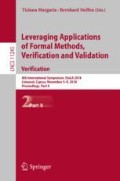Abstract
Many practical, especially real-time, systems are expected to be predictable under various sources of unpredictability. To cope with the expectation, a system must be modeled and analyzed precisely for various operating conditions. This represents a problem that grows with the dynamics of the system and that must be, typically, solved before the system starts to operate. Due to the general complexity of the problem, this paper focuses just to processor based systems with interruptible executions. Their predictability analysis becomes more difficult especially when interrupts may occur at arbitrary times, suffer from arrival and servicing jitters, are subject to priorities, or may be nested and un/masked at run-time. Such a behavior of interrupts and executions has stochastic aspects and leads to the explosion of the number of situations to be considered. To cope with such a behavior, we propose a simulation model that relies on a network of stochastic timed automata and involves the above-mentioned behavioral aspects related to interrupts and executions. For a system, modeled by means of the automata, we show that the problem of analyzing its predictability may be efficiently solved by means of the statistical model checking.
This work was supported by The Ministry of Education, Youth and Sports of the Czech Republic from the National Programme of Sustainability (NPU II); project IT4Innovations excellence in science – LQ1602. Next, it was supported by the project Advanced parallel and embedded computer systems – FIT-S-17-3994.
Access this chapter
Tax calculation will be finalised at checkout
Purchases are for personal use only
Notes
- 1.
models are available at http://www.fit.vutbr.cz/~strnadel/publ/2018/dandt/.
References
Kopetz, H.: Real-Time Systems - Design Principles for Distributed Embedded Applications. Real-Time Systems Series, 376 p. Springer, New York (2011). https://doi.org/10.1007/978-1-4419-8237-7. ISBN 978-1-4419-8236-0
Buttazzo, G.: Hard Real-Time Computing Systems: Predictable Scheduling Algorithms and Applications, 376 p. Springer, New York (2011). https://doi.org/10.1007/978-1-4614-0676-1. ISBN 978-1-4614-0675-4
Wilhelm, R., et al.: The worst-case execution-time problem - overview of methods and survey of tools. ACM Trans. Embed. Comput. Syst. 7(3), 36:1–36:53 (2008). https://doi.org/10.1145/1347375.1347389
Strnadel, J., Rajnoha, P.: Reflecting RTOS model during WCET timing analysis: MSP430/FreeRTOS case study. Acta Electrotechnica et Informatica 12(4), 17–29 (2012). https://doi.org/10.2478/v10198-012-0041-3
Dalsgaard, A.E., Olesen, M.C., Toft, M., Hansen, R.R., Larsen, K.G.: METAMOC: modular execution time analysis using model checking. In: Lisper, B. (ed.) 10th International Workshop on Worst-Case Execution Time Analysis (WCET 2010). OASIcs, vol. 15, pp. 113–123. Schloss Dagstuhl-Leibniz-Zentrum fuer Informatik, Dagstuhl, Germany (2010). https://doi.org/10.4230/OASIcs.WCET.2010.113
Cassez, F., de Aledo, P.G., Jensen, P.G.: WUPPAAL: computation of worst-case execution-time for binary programs with UPPAAL. In: Aceto, L., Bacci, G., Bacci, G., Ingólfsdóttir, A., Legay, A., Mardare, R. (eds.) Models, Algorithms, Logics and Tools. LNCS, vol. 10460, pp. 560–577. Springer, Cham (2017). https://doi.org/10.1007/978-3-319-63121-9_28
Regehr, J., Duongsaa, U.: Preventing interrupt overload. In: Proceedings of the ACM SIGPLAN/SIGBED Conference on Languages, Compilers, and Tools For Embedded Systems, New York, United States, pp. 50–58. ACM (2005). https://doi.org/10.1145/1070891.1065918
Pellizzoni, R.: Predictable and monitored execution for cots-based real-time embedded systems, Ph.D. thesis, Bonn, Germany. University of Illinois at Urbana-Champaign (2010)
Amiri, J.E., Kargahi, M.: A predictable interrupt management policy for real-time operating systems. In: Proceedings of CSI Symposium on Real-Time and Embedded Systems and Technologies (RTEST), pp. 1–8. IEEE (2015). https://doi.org/10.1109/RTEST.2015.7369843
Lynx. Lynx Software Technologies Patented Technology Speeds Handling of Hardware Events (2018). http://www.lynx.com/whitepaper/lynx-software-technologies-patented-technology-speeds-handling-of-hardware-events/
Leyva-del Foyo, L.E., Mejia-Alvarez, P., de Niz, D.: Integrated task and interrupt management for real-time systems. ACM Trans. Embed. Comput. Syst. 11(2), 32:1–32:31 (2012). https://doi.org/10.1145/2220336.2220344
Cottet, F., Delacroix, J., Kaiser, C., Mammeri, Z.: Scheduling in Real-Time Systems. Wiley, New York (2001). ISBN 978-0-470-84766-4
Automotive Open System Architecture GbR (AUTOSAR). Specification of Operating System. Technical report (2018). http://www.autosar.org
Strnadel, J.: Predictability analysis of interruptible systems by statistical model checking. IEEE Des. Test 35(2), 57–63 (2018). https://doi.org/10.1109/MDAT.2017.2766568
Chattopadhyay, S., Tresina, M., Narayan, S.: Worst case execution time analysis of automotive software. Procedia Eng. 30, 983–988 (2012). https://doi.org/10.1016/j.proeng.2012.01.954
Kotker, J., Sadigh, D., Seshia, S.A.: Timing analysis of interrupt-driven programs under context bounds. In: Proceedings of Formal Methods in Computer-Aided Design (FMCAD), pp. 81–90 (2012)
Kidd, N., Jagannathan, S., Vitek, J.: One stack to run them all. In: van de Pol, J., Weber, M. (eds.) SPIN 2010. LNCS, vol. 6349, pp. 245–261. Springer, Heidelberg (2010). https://doi.org/10.1007/978-3-642-16164-3_18
Wu, X., Wen, Y., Chen, L., Dong, W., Wang, J.: Data race detection for interrupt-driven programs via bounded model checking. In: Proceedings of the 2013 IEEE Seventh International Conference on Software Security and Reliability Companion, SERE-C 2013, Washington, DC, USA pp. 204–210. IEEE CS (2013). https://doi.org/10.1109/SERE-C.2013.33
Kroening, D., Liang, L., Melham, T., Schrammel, P., Tautschnig, M.: Effective verification of low-level software with nested interrupts. In: Proceedings of the 2015 Design, Automation & Test in Europe Conference & Exhibition, ser. DATE 2015, Jose, CA, USA, pp. 229–234. EDA Consortium (2015). http://dl.acm.org/citation.cfm?id=2755753.2755803
Baier, C., Katoen, J.-P.: Principles of Model Checking, ser. Representation and Mind. MIT Press, London (2008). https://mitpress.mit.edu/books/principles-model-checking
David, A., Larsen, K.G., Legay, A., Mikucionis, M., Poulsen, D.: UPPAAL SMC tutorial. Int. J. Softw. Tools Technol. Transf. 17(4), 397–415 (2015). https://doi.org/10.1007/s10009-014-0361-y
Author information
Authors and Affiliations
Corresponding author
Editor information
Editors and Affiliations
Rights and permissions
Copyright information
© 2018 Springer Nature Switzerland AG
About this paper
Cite this paper
Strnadel, J. (2018). Statistical Model Checking of Processor Systems in Various Interrupt Scenarios. In: Margaria, T., Steffen, B. (eds) Leveraging Applications of Formal Methods, Verification and Validation. Verification. ISoLA 2018. Lecture Notes in Computer Science(), vol 11245. Springer, Cham. https://doi.org/10.1007/978-3-030-03421-4_26
Download citation
DOI: https://doi.org/10.1007/978-3-030-03421-4_26
Published:
Publisher Name: Springer, Cham
Print ISBN: 978-3-030-03420-7
Online ISBN: 978-3-030-03421-4
eBook Packages: Computer ScienceComputer Science (R0)

